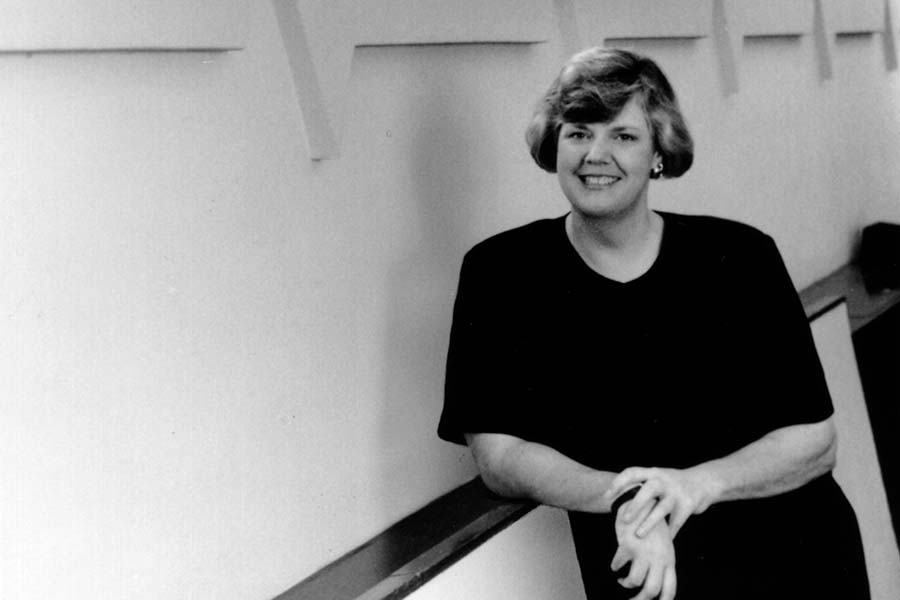Edith H. Love, longtime managing director at Atlanta's Alliance Theatre Company, died in February.
In 1985 I went to work at the Alliance Theatre Company. I had recently moved from Toledo to Atlanta when my partner was transferred there with his industrial equipment company. Initially I was a telemarketer, selling season tickets over the phone; then I moved into the development department entering data on a state-of-the-art Burroughs computer. My work station was directly around the corner from managing director Edith Love’s office.
Day after day, hour after hour, there was a constant stream of people walking past my desk to enter Edith’s office. Within minutes of someone turning the corner, gales of laughter would flow back around the corner to me. Ultimately the person who entered the office would emerge with a great big smile on their face. At that time I never knew what prompted the hilarity and joviality. I was supremely jealous—not only because I wasn’t invited to join in on the delight, but because I too wanted to inspire that kind of joy in the people around me.
Eventually I became Edith’s assistant and stayed. I got to experience that joy and laughter for 10 years.
Edith Love was an anomaly in the LORT world then. She was the managing director of a very large institution. Not yet 40 years old and female, she took what she learned from Bernard Havard and worked to build a company committed to its community. I remember Edith telling the leadership at the Woodruff Arts Center that the building would never be a cultural home to everyone in Atlanta as long as it looked like the white-pillared plantation mansion on the hill. (Ultimately the Arts Center undertook major renovations, making it a warm, open, and welcoming space.)
Edith loved theatre in all its forms. She understood the remarkable ability of the art form to challenge injustices and change misguided cultural perceptions. In 1985 Edith hatched the idea to bring Lee Breuer and Bob Telson’s Gospel at Colonus to Atlanta after seeing a production at Arena Stage. Putting dozens of black actors and singers onstage, working with a huge local gospel choir, and forging a partnership with Pearl Cleage’s Just Us Theatre Company, the Alliance entered uncharted and sometimes difficult waters in an effort to welcome every person in the Atlanta community to its theatre.
Over the years Edith was fortunate to work with some of our finest regional theatre artistic directors, including Kenny Leon, Bob Farley, Fred Chappel, and Kent Stephens at the Alliance Theatre; Chris Coleman at Portland Center Stage and Richard Hamburger at Dallas Theatre Center. She was also instrumental in bringing to life many new important plays from great playwrights like Pearl Cleage and Alfred Uhry. But most of all, Edith reveled in the great American musical, and she found her muses in the likes of directors David Bell and Fran Soeder.
In 1989 Edith spearheaded an exchange with a theatre company in Moscow. The exchange included the Alliance taking its long-running production of Driving Miss Daisy to Russia. In 1991 she took the same production overseas to Shanghai in China.
Edith was also a champion for the young theatre professional. There are many people working in the industry today because Edith shared her expertise unconditionally and encouraged learning at every turn. In 1995, Edith told me it was time for me to move up to a leadership position in theatre. When I became the managing director of Virginia Stage Company, she was always there to help guide and encourage me. I know she did the same for dozens of theatre professionals throughout the country.
When Edith became the managing director at the Alliance Theatre she joined a small but impressive group of women leaders in regional theatre—a list that included Sara O’Connor, Jessica Andrews, Susie Medak, Linda DiGabriele, Paula Tomei, and Victoria Nolan, to name a few. They banded together into a group they called the Ladies of LORT. In a world dominated by white men, this group of astonishing women worked together to provide mutual support and encouragement in the face of a domineering cultural that at the time placed little value on diversity of any kind. Edith was proud to be a part of a group of pioneers at the forefront of changing the face of regional theatre. I, along with so many others, was proud to learn from her, and to know that my mentor was leading the way forward for our field.
On a personal note, Edith loved playing games of every kind. While bridge was one of her favorites, she reveled in hosting Trivial Pursuit nights at her home. Ten to 20 people would gather, eat, drink, and form teams that emitted oohs and aahs at someone knowing an obscure fact and boos at anyone who missed a theatre question. These were great evenings filled with the joy and love of friendship that Edith took everywhere she went.
Edith died in February at the age of 66. I know I speak for so many who loved and admired her when I say she will be missed.


